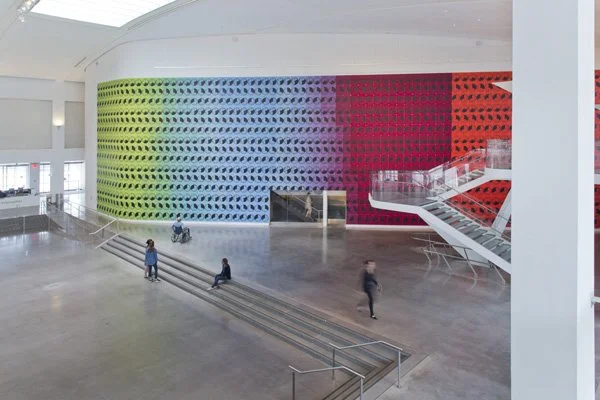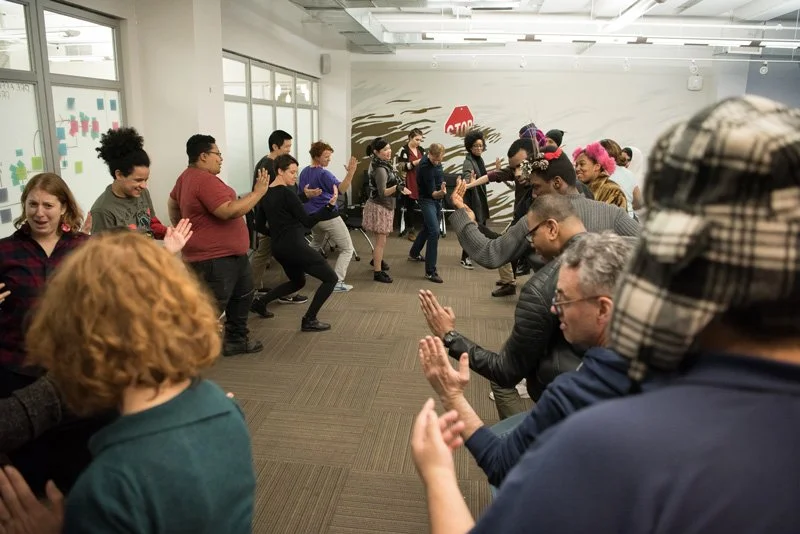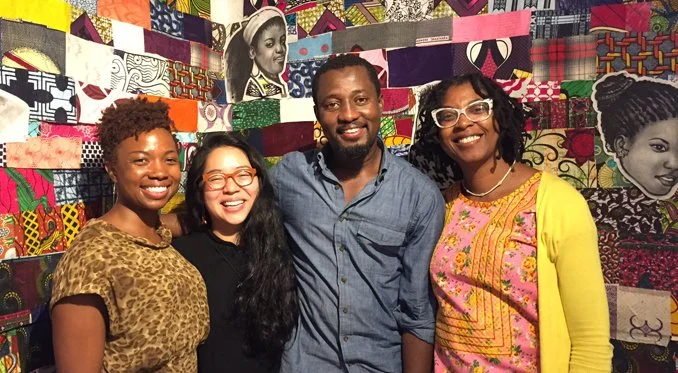A HISTORY OF SUPPORTING COMMUNITIES
The Shelley & Donald Rubin Foundation believes in art as a cornerstone of cohesive, resilient communities and greater participation in civic life. In its mission to make art available to the broader public, in particular to underserved communities, the Foundation historically provided direct support to cultural organizations and advocates of social justice across the public and private sectors in the form of grants, as well as exhibitions and programs at The 8th Floor. Through these endeavors, the Foundation supported cross-disciplinary work connecting art with social justice via experimental partnerships, as well as extended cultural resources to organizations and areas of New York City in need.
The Shelley & Donald Rubin Foundation was incorporated in 1995, with initial grants to Art in Hospitals and The Center to Prevent Handgun Violence. Its early mission was to support the arts, meet urgent human needs, defend liberty, and promote social justice. The geographic areas of concern were primarily New York City and the Himalayan region of Asia. Evelyn Rich, who served from 1995 to 2004, was the Foundation’s first Executive Director. Following her departure, Bruce Payne, who served as Executive Director until 2013, oversaw a substantial increase in activity, expanding both projects and grants. Alexander Gardner became Executive Director in 2013 and served until 2016. From 2015, Sara Reisman oversaw the implementation of the Art and Social Justice initiative, ultimately serving as Executive and Artistic Director of the Foundation until Spring 2021.
Meg Webster, Concave Room for Bees, Socrates Sculpture Park. [Image Description: Constructed circular garden made of mostly of green plants. Behind the installation is the East River and a view of Manhattan skyscrapers.]
LOOKING TO THE FUTURE
For over 25 years, the Shelley & Donald Rubin Foundation provided millions of dollars in funding to support the city’s non-profit arts organizations and those working in art and social justice. After an extensive internal review of its resources, the Foundation determined that it would be most effective to discontinued the grantmaking program as of 2021, focusing its resources on exhibitions and events at The 8th Floor.
In February 2022, Anjuli Nanda Diamond was announced as Artistic Director after a decade of curatorial, educational, and editorial work with the Foundation. In her tenure she has overseen the publication of An Incomplete Archive of Activist Art, a two-volume publication reflecting on the Foundation’s art and social justice initiatives since 2015, and the launch of the Foundation’s annual Curatorial Open Call, a platform for curators, academics, and art historians to stage exhibitions at The 8th Floor.
The Foundation will continue to serve as an advocate for its former grantees and those supporting art and social justice initiatives, and is currently exploring alternative ways to support its community.
Mierle Laderman Ukeles, One Year’s Worktime II, 2016. Courtesy of Foundation 2021 grantee Queens Museum. Photo by Hai Zhang. [Image Description: A photograph of a large atrium space with a massive rainbow-like color mural in the background, running from left to right in green, blue, red, and orange. It has an abstract geometric pattern all over it.]
More about our grantS PROGRAM history
Through the annual grants program, the Foundation supported ethical artistic practice that aimed to broaden access to art in the five boroughs of New York City. In recent years, grants ranged from $2,500 to $50,000; the Foundation was open to reviewing requests on a variety of scales.
For project support, the Foundation’s recent policy was to match funds, requiring that applicants demonstrated they have raised (or, a plan to raise) at least half of the project costs. First-time applicants were encouraged to apply for project support rather than general operating funds. Once an organization received a project grant, applications for general operating support in the following year were welcome. The Foundation’s recommendation was that general operating support requests would not exceed ten percent of overall operating costs.
We were interested in supporting organizations that compensate individuals such as artists, activists, educators, or cultural producers fairly. For Foundation programming delivered at The 8th Floor, we refer to the fee calculator established by W.A.G.E. (Working Artists in the Greater Economy). We recognize W.A.G.E. represents a floor, in other words, a minimum. When possible, grantee organizations were encouraged to compensate artists, cultural producers, and activists at a scale that is both proportional to programming budgets and contributes to a living wage.
Similarly, we were interested in understanding how grantee organizations facilitated greater access to ensure broad participation in funded programs. While we were aware that many organizations did not own their premises (and therefore may not have complete control over inclusive design), we required that applicant organizations demonstrated how they address accessibility in their grant application. The City of New York Department of Design and Construction in partnership with The Mayor’s Office for People with Disabilities produced a brochure called Universal Design New York that highlights inclusive design guidelines. For accessibility awareness that extends beyond architecture and physical design, we recommend referring to artist Carmen Papalia’s For a New Accessibility, which promotes a flexible but inclusive approach to programs designed to accommodate audience and participants on a more customized basis.
Click here to view a list of our past grantees, and here for an archive of news items related to our past grantees.
The guests of a Theater of the Oppressed scene-sharing workshop warm up together. Photo by Alex Woodhouse. [Image Description: A large number of people engage in a theater workshop in a circular formation. Each holds their hand out towards the center, exclaiming something.]
Ahmed Tijay Mohammed, a Laundromat Project Artist-in-Residence, with LP staff. Photograph courtesy of George Bolster. [Image Description: Four people smiling in front of a collage featuring African fabrics and portraits of women.]




